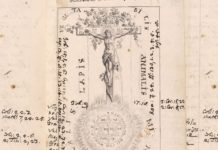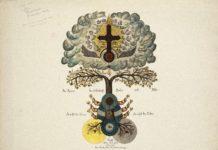In the time I’ve spent contributing to Pansophers and serving as an admin to the Rosicrucian Tradition’s group’s online forum (along with several other exceptional individuals), a recurring theme becomes evident: the prevalence of binary thinking within discussions surrounding Rosicrucianism. Binary thinking is when one thinks there are only two sides to a subject, and they can only choose one side. It can manifest when individuals perceive an opposition between two things where none necessarily exists. Given the non-dualistic nature associated with philosophies like Hermeticism within the realm of Rosicrucianism, the emergence of binary thinking can feel out of place. This article will attempt to describe some ways binary thinking can lead one into the trap of seeing unnecessary dichotomies.
The wider Rosicrucian community consists of a broad array of individuals. Some belong to orders and primarily prefer to follow teachings given to them. There are others who adopt a more independent approach. Within these camps, some lean more towards expressing themselves through personal experiences. Others favor a more scholarly approach. Some might be academics, and others practitioners. Some might be both. Each approach may be different, but each serves to define Rosicrucianism as a whole. Introducing binary thinking into this environment isolates parts of the whole and attempts to put cooperative faculties at cross purposes to one another, rather than seeing them as contributing to a common goal. Binary thinking can break up communities. And yet it also has the tendency to stifle our own individual development.
The habit of seeing dichotomies wherever one looks treats the human being—and their development—as one-sided. For example: “a person can’t be spiritual if they are too rational.” Or, “a person who develops their spirituality has no need for reason.” Such thinking doesn’t often consider that one’s spiritual inclination and their reasoning faculty, to give just one example, are but parts of the human being—parts of the whole, among other faculties constituting the individual. The rejection of one’s whole nature can lead to false impressions or judgments and to one-sidedness. Especially in an online setting, where some may appear a certain way at the surface. But it doesn’t describe the individual in private. Human beings are not billboards or soundbites, and have more depth than how they appear via their online persona. In person, what you see is not necessarily what you get. It is crucial to remember that the world encompasses more than just two possibilities: of one vs. other.
As it turns out, history gives us many instances where humans practiced and developed seemingly “dualistic” faculties at the same time. They also did so without conflict. The ancient Greeks practiced philosophical discourse while attending the rites of the ancient mysteries. In late antiquity, philosophy lead to the development of early theological and esoteric thought, whether it be Jewish (Philo of Alexandria), Christian (Pseudo Dionysius, Clement, Origen, etc.), or Hermetic (the Corpus Hermeticum). Same went for the Arabic world with the relationship between late Platonism and Sufism. Looking at the Medieval and Renaissance periods too, we see many who practiced magic, alchemy, Hermeticism, and esoteric spirituality while also studying the arts and sciences. One might consider how the study of grammar, logic, and rhetoric (the trivium), combined with arithmetic, music, geometry, and astronomy (the quadrivium) preceded esoteric thought at the time. Consider the work of Ficino, Trithemius, Paracelsus, or Agrippa.
Or, consider the writers of the Rosicrucian Manifestos. The writers of the Rosicrucian Manifestos were highly educated people who met and convened at the University of Tübingen in the Tübingen circle, which included Johann Valentin Andreae, Christoph Besold, and Tobias Hess. I doubt any of them would have considered any conflict to exist between their studies, professional work, and spirituality. Members of this Rosicrucian circle were scientists, physicians, philosophers, and writers, as well as theologians, priests, and esotericists. Their pluralistic activities weren’t a cause for inner despair, but rather combined to contribute to their unique abilities and output.
From here, we’ll walk through some of the other commonly perceived dichotomies we encounter while studying and practicing Rosicrucianism.
Historical vs. and Living Tradition
This argument asserts that some people are “too historical” in their approach, opposed to others who are actively bringing the tradition up to the present through their spiritual or esoteric practice. This dichotomy often frames the “armchair” vs. “true occultist” debate as well. The other side to this argument, however, is that some rely heavily on their personal spiritual experiences, whereas matters of verifiable knowledge might do well to consider a wider scope of events and accounts made available through historical resources.
One can study history and engage in active esoteric traditions at the same time—without their being a conflict. There could be a problem if one were to confuse the studying of history with the development of an esoteric practice. Yet if one knows what an esoteric practice is, and what the study of history is, there shouldn’t really be any cause for concern. Being involved in a study of history doesn’t replace esoteric practice, just as an esoteric practice doesn’t replace the study of history. Both can be valuable for framing the meaning and value of Rosicrucianism in the present. It is also very likely both practices could benefit from gaining a basic understanding offered by the other.
Academic vs. and Practitioner
This argument is similar to the one above, but focuses directly on the disciplines involved. The common assertion is that academics give an inexperienced, outsider’s perspective on esotericism or occultism, while the practitioner gives a more authentic version of esotericism because they’ve experienced it firsthand. The other side to the argument, however, is that practitioners often base certainty on any impression about history or facts that suit their mood (or their spirit guides). Of course, both arguments are gross generalizations.
What’s curious about the academic vs. practitioner argument is that sometimes I meet practitioners who go deep into scholarly pursuits after being involved with their esoteric practice for some time. It seems that often, long-term practitioners reach a point in their life where they start reflecting more deeply on the historical roots of the traditions they’ve intimately known and experienced. Among those in this camp, I’ve never seen anyone appear conflicted by producing scholarly work while keeping up with their spiritual observances. Usually, their work is involved with clarifying the background, teachings, theologies, or practices of their inherited traditions. Doesn’t sound too bad.
Furthermore, I’ve never seen an academic pretend to be an esoteric practitioner, or try to suggest their work replaces esoteric practice. If anything, many academics in the esoteric community seem to avoid committing such ambiguities altogether. The aims of academic work is to further our understanding of the cultural, social, biographical, theological, and philosophical dimensions of earlier esoteric beliefs and practices. Such knowledge can help us become more intimate with such subjects, and in turn, refine our esoteric practices. Also doesn’t sound too bad.
And what about the work of a practitioner helping in the realm of academic study? There are works such as Lawrence Principe’s The Secrets of Alchemy which show how direct practice with an historical subject can shed new light on how to interpret earlier texts. No doubt, the performance and experience of rituals could also benefit our understanding of esoteric studies.
Overall, being an academic or a practitioner, again, are two different disciplines, which if we understand where their margins lie, don’t necessarily have to be at odds with one another. One can be a good scholar, or a good practitioner, or they can be both at the same time.
Intellectual vs. and Spiritual
The pattern should be familiar now. We’ve touched on a few so-called dichotomies. However, this one seems to get at the core. In today’s understanding, being “intellectual” is someone who likes to think about things; to analyze, study, or learn by reading. By this, we understand intellectualism to be a “mental” activity. That is, an activity of our own unique psychology, or brains. Being “spiritual”, on the other hand, is to sense or experience beyond this territory; to experience things at a more subtle, deeper, or more transcendent level of reality. Given the various ways people like to express spirituality, though, it can be a little more difficult to define. The text book definition gives us some further clues:
spir·it·u·al·i·ty
noun
the quality of being concerned with the human spirit or soul as opposed to material or physical things
What is interesting here is the idea that spirituality focuses on the spirit or soul, opposed to material or physical things (yes, another dichotomy, but let’s put this aside for now). What’s important is that spirituality is defined as “non-physical.” However, so is intellect. The capacity of the intellect, similar to spirituality, is non-material [Keeping in mind though that classical views of spirit and soul were often that these ARE in fact material. We might do better describing them as subtle rather than immaterial]. This means we can’t necessarily use spirituality vs. intellect as a dichotomy based on material vs. non-material grounds.
Things get even more curious the closer we look at them from a classical point of view. What we think of as intellect might have carried a different meaning in the past than it does today. The capacity for being intellectual may have been closer in meaning to having a particular sense faculty. According to the Oxford Reference, the Latin root word intellectus carries the meaning of “comprehension, understanding, reason, discerning, meaning, sense, intuition, consciousness, perception, representation, or soul.” None of these sounds that strange until seeing intuition and soul included. Likely only a few would consider there to be a similarity between intellect and intuition, or between thinking and soul. Most would likely see these as opposites.
Even more interesting is learning that intellectus was the word commonly used to translate the word nous from Greek into Latin. Scholars have argued that the common translation of nous as “mind” or “intellect” is generally insufficient, if not misleading, considering its deeper connotations. In his Hermetic Spirituality and the Historical Imagination, Wouter Hanegraaf addresses the issue of translating nous as “intellect” with a quote by French scholar André-Jean Festugière:
“…when we are dealing with that particular noēton referred to as God, then the nous is no longer the human “intellect” properly speaking but a pure faculty of intuition or spiritual apprehension.”
Later, he continues:
“And so it is that the same word nous refers at the same time to the normal instrument for knowing things that can be thought and to the instrument of mystical intuition that enters into contact with the anoēton [that which can not be thought].”
With this in mind, it becomes difficult to cleanly separate intellect from spirit, or to see them being at odds with one another. From the classical mindset, the same sense faculty could be capable of common knowledge, as well as spiritual knowledge (i.e. experience).
Initiatic Tradition vs. Book Tradition
This particular argument has emerged recently: the claim that Rosicrucianism is an initiatic tradition, and that those involved with Rosicrucianism as a book tradition (that is, they like to read, comprehend, or contemplate historical Rosicrucian books) are fake Rosicrucians. This is a rather curious accusation, so let’s break it down a bit.
To believe this, one would first need to be convinced that the activities seen of others online, like in Facebook groups, are a total measure of what they consider Rosicrucianism to be. This is an odd assumption, since it’s likely that at least some who study such materials would also be invested in esoteric practice. And if they were, they would understand what initiation is and what reading a book is. There are even some who consider that certain texts are initiatory by reading them. This accusation, thus, seems to be an effort to gatekeep Rosicrucianism. One can be initiated in a group or other setting, and still consider books on Rosicrucian subjects to be important for their personal development.
Yet there is another point to be made about initiatic traditions. Some groups and individuals assume they carry an initiatic lineage back to the likes of figures like the Gold- und Rosenkruezer or Eliphas Levi, to name a few. However, these figures carry an intellectual literary tradition leading back to earlier Rosicrucian influences. More specifically, they reference works written by figures like Paracelsus, Agrippa, Trithemius, Reuchlin, Khunrath, Postel, von Rosenroth—the list goes on. This literary tradition helps to illustrate the practices and beliefs held by these earlier Rosicrucian figures. Perhaps ironically, these are things we might not know without reading and studying these materials.
Often, when we encounter binary thinking in Rosicrucianism, it can appear as gatekeeping. Other times, it comes off as someone’s desire to make the outer world reflect their own internal world. There are other ways to do this, though. Ways that are likely more productive and cooperative within a greater Rosicrucian community.









